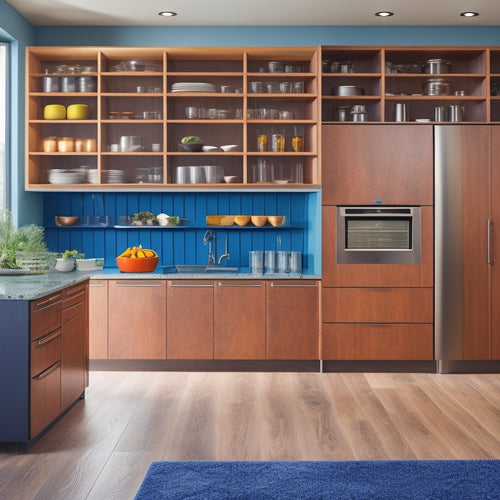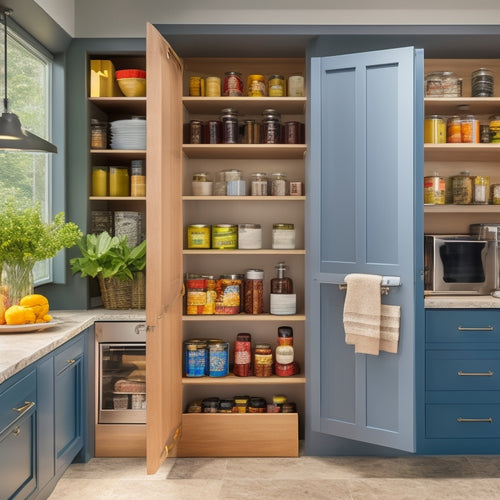
Revolutionizing Catering: Software for Seamless Operations
Share
Effective catering management software revolutionizes catering businesses by streamlining operations, reducing errors, and enhancing profitability. It automates and centralizes key operational tasks, efficiently managing orders, inventory, and guarantees seamless event execution. By automating manual processes, reducing labor costs and errors, and providing data-driven insights, catering businesses can optimize menu prices, reduce waste, and make informed decisions. By integrating with POS and CRM systems, businesses can amplify operational efficiency and profitability. To discover the full potential of catering software and reveal the secrets to seamless operations, explore the essential features and benefits that can take your business to the next level.
Key Takeaways
• Automate catering operations to free up time and resources for exceptional customer experiences and increased profitability.
• Streamline orders, inventory, and staff management for seamless event execution and reduced errors.
• Leverage data-driven insights to set ideal menu prices, optimize inventory, and make informed business decisions.
• Integrate with POS and CRM systems for amplified operational efficiency, real-time sales data, and valuable analytics insights.
• Professional proposal templates and unique brand representation help caterers stand out in the market and improve customer satisfaction.
Streamlining Catering Operations
By automating and centralizing key operational tasks, catering software revolutionizes the way catering businesses manage their day-to-day activities, freeing up valuable time and resources to focus on delivering exceptional customer experiences. This streamlining of operations enables caterers to efficiently manage orders, inventory, and staff, ensuring seamless event execution.
Menu customization features allow for tailored offerings, while staff scheduling tools optimize labor allocation, reducing errors and improving productivity. With automated kitchen and ops reports, caterers can eliminate manual calculations, reducing the risk of errors and increasing accuracy.
Data Privacy and Cookie Usage
In today's digital environment, where online interactions have become an integral part of business operations, catering software must prioritize data privacy and cookie usage to guarantee transparency and compliance with regulations.
As users engage with catering software online, it is essential to make sure that their data is protected and used responsibly. This involves obtaining user consent for cookie usage, particularly advertisement cookies that track visitors across websites to provide targeted ads.
Improving compliance with data privacy laws, such as obtaining user consent through 'Save & Accept' options, is vital. By prioritizing data privacy and cookie usage, catering software can establish trust with users, making sure a seamless and secure online experience.
Essential Features and Benefits
Five key features of catering software enable catering businesses to efficiently manage events, reduce errors, and increase profitability. These features include professional proposal templates, quick selection lists, unique brand representation, automated back-of-house reports, and streamlined operations.
Professional proposal templates and quick selection lists facilitate menu customization, allowing caterers to tailor their offerings to clients' specific needs. Unique brand representation ensures that businesses can showcase their identity and stand out in a competitive market.
Automated back-of-house reports simplify kitchen operations by eliminating manual calculations and reducing the risk of errors. This feature, along with streamlined operations, helps catering businesses to streamline their processes, improve customer satisfaction, and drive profit.
Integrating With Other Systems
Catering software's ability to seamlessly integrate with other systems, such as point-of-sale (POS) and customer relationship management (CRM) systems, amplifies its impact on operational efficiency and profitability. This integration enables system compatibility, ensuring smooth data flow between platforms.
By integrating with POS systems, catering software can access real-time sales data, streamlining inventory management and reducing errors. Meanwhile, integration with CRM systems provides valuable analytics insights, enabling caterers to better understand customer preferences and tailor their services accordingly.
This seamless integration eliminates manual data entry, reducing the risk of errors and increasing overall system functionality. By leveraging these integrations, catering businesses can make data-driven decisions, optimize operations, and drive growth.
Enhancing Profitability and Efficiency
By automating manual processes and leveraging data-driven insights, catering businesses can greatly enhance their profitability and operational efficiency. This is achieved through:
-
Streamlined operations: Automating tasks reduces labor costs and minimizes errors, freeing up resources for more strategic activities.
-
Enhanced menu pricing: Data-driven insights help catering businesses set ideal menu prices, increasing revenue and profitability.
-
Improved inventory management: Accurate inventory tracking and automated reporting reduce waste and overstocking, resulting in cost savings.
- Data-driven decision-making: With access to real-time data and analytics, catering businesses can make informed decisions to drive growth and profitability.
Frequently Asked Questions
Can Catering Software Accommodate Special Dietary Requests and Restrictions?
Like a master chef orchestrating a harmonious kitchen, catering software expertly handles special dietary requests and restrictions through robust allergen management, menu customization, cross-contamination prevention, and precise ingredient tracking, ensuring safe and tailored culinary experiences.
How Often Does the Software Require Updates and Maintenance?
The software typically requires quarterly updates to guarantee peak performance and compatibility, with minimal downtime; maintenance costs are bundled into the subscription fee, guaranteeing predictable expenses and minimizing financial burdens.
Is Customer Support Available 24/7 for Technical Issues?
Imagine having a dedicated technical lifeline, available 24/7, to address any software hiccups, ensuring uninterrupted operations. Our customer support team provides swift technical solutions, guaranteeing seamless functionality and peace of mind for catering businesses.
Can the Software Be Customized to Fit My Business's Unique Brand?
The software offers customization options to guarantee brand consistency, including unique features for dietary accommodations, with regular software updates and 24/7 customer support, plus startup discounts and benefits tailored for small businesses.
Are There Any Discounts for Small or Startup Catering Businesses?
Like a tailored suit, our pricing strategy is designed to fit your business needs, offering flexibility for small or startup catering businesses to gain a competitive advantage, ensuring a perfect fit for your budget and growth goals.
Related Posts
-

Sink Caddy Organizers for Farmhouse Style Kitchens
Sink caddy organizers are perfect for elevating your farmhouse-style kitchen while keeping it functional. You'll love...
-

Roll-Out Trays for Modular Kitchen Cabinets
Roll-out trays are the perfect addition to your modular kitchen cabinets, enhancing both accessibility and organizati...
-

Affordable Sliding Pantry Drawer Solutions
If you're looking for affordable sliding pantry drawer solutions, you're in the right place. These drawers maximize s...


